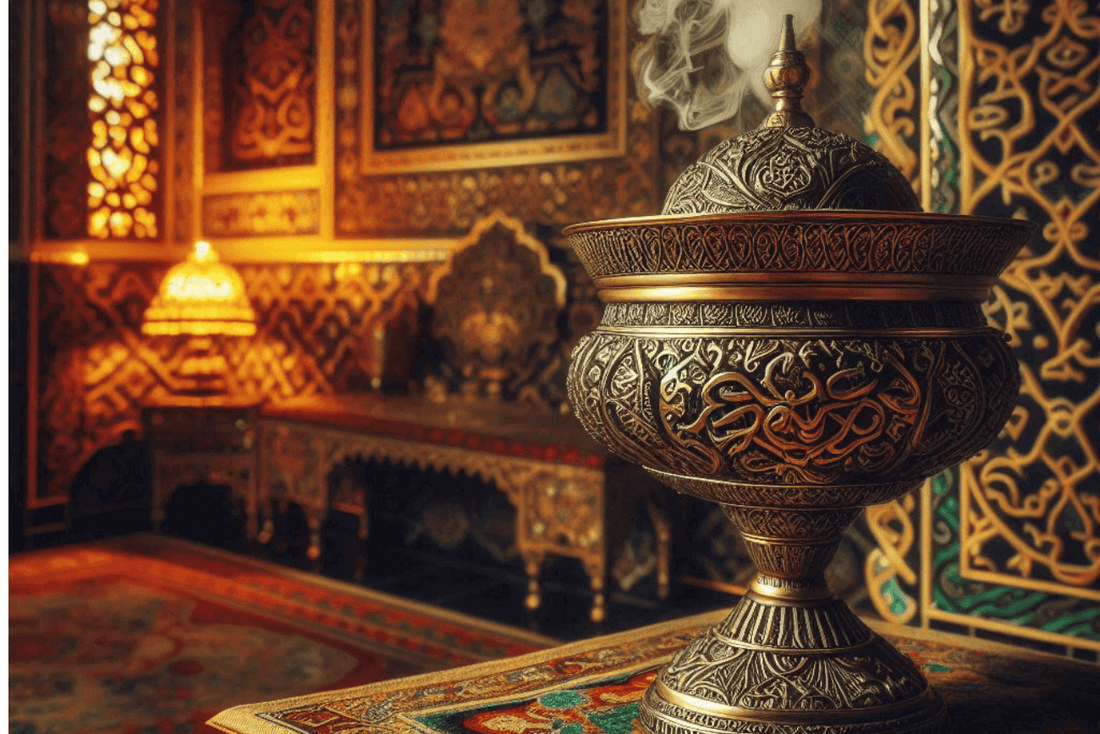
Scent as an element of identity and spirituality in Middle Eastern culture
Share
Imagine entering a home where, from the very threshold, you’re greeted by the gentle smoke of incense - enveloping your hair, your clothes, and the entire space around you. Not simply to smell nice, but to honor your presence, to express deep respect. This seemingly simple gesture speaks volumes... What exactly does it tell us? That’s what this article is about.
While the language of scent (and of perfume) is universal and transcends borders, the way fragrances are created and experienced is deeply shaped by cultural context. Nowhere is this truer than in the East - particularly in Arab and Indian cultures - where scent is far more than an aesthetic element. Intrigued? Let yourself be drawn into a story where scents not only please the senses but mean something...
Perfume as a manifestation of spirit and self
Oriental perfumery is deeply rooted in the traditions of the Middle East, where fragrance has always been more than just a styling detail. It is a profound expression of spirituality and identity, woven into both ceremonial and everyday moments. Scent becomes an essential part of rituals like prayer, hospitality, self-care - even domestic life.
In Arab tradition, welcoming guests with the smoke of bakhour (a blend of natural aromatic ingredients) is a gesture of hospitality and a symbol of unity. The rising and falling trails of smoke spiritually connect those gathered under one roof.
A social and sacred duty
In Middle Eastern societies, wearing fragrance is also considered a social responsibility, tied to cultural taboos around body odor. The natural scent of sweat or skin is often deemed inappropriate - even impure. To maintain harmony and purity of all the senses, fragrance is applied in layers:
- traditional soaps,
- nourishing oils,
- perfume itself,
- bakhour to perfume hair, clothing, and the entire room.
Interestingly, the Prophet Muhammad encouraged the use of perfumes - especially before Friday prayers - as a way to elevate the soul and bring beauty to the faithful. One of his most famous hadiths says:
In this world, women and perfume have been made dear to me, and my comfort has been provided in prayer.
This beautifully illustrates how scent becomes a bridge between the physical and the spiritual, a sign of self-respect and reverence, and a way to prepare oneself for the sacred. In the Middle East, prayer literally carries a fragrance, and scent rituals create a space of sacred intimacy.

Scented rites of passage
Fragrance also plays a significant role in transitional life moments. One notable example is the traditional preparation of a bride before her wedding. A few days before the ceremony, the young woman undergoes a series of cleansing and beautifying rituals - bathing in oils, receiving massages, applying henna, and perfuming her body and hair with bakhour smoke.
In this context, fragrances were believed to seduce, protect, and bless the upcoming marriage. These preparations were emotionally charged and rich in intimacy and female solidarity - a beautiful ritual of transformation.
Fun fact: Many of these traditions still exist today - though in a modernized form. Luxurious attars (highly concentrated oils distilled from flowers, herbs, woods, resins, or spices) and elaborate bakhour sets are still used in bridal preparations or given as wedding gifts.
The sacred ingredients of oriental perfumery
Middle Eastern perfumes are never a random blend of notes. Each ingredient carries deep religious, social, and symbolic meaning. Oriental compositions are known for their depth, intensity, and longevity, built upon sacred and luxurious materials:
🌳 Oud – Resin from the agarwood tree, often called the “black gold of perfumery.” In Islam, it's considered the scent of paradise; its smoke has purifying powers.
🕯️ Frankincense & Myrrh – Among the world’s oldest fragrances, dating back to ancient Egypt. In Islam, as in Christianity and Judaism, they are used in sacred rituals, symbolizing purity and the divine presence.
🧡 Amber – A symbol of luxury, long treasured in Arab culture. It connects the body to the intangible.
🌹 Damask Rose – Known as the “Queen of the Night,” used to purify sacred spaces and mosques. In perfumery, it represents tenderness and spirituality. In Iran and Saudi Arabia, rose oil often accompanies prayer and key family rituals.
🧂 Spices – Cardamom, cinnamon, and precious saffron evoke wealth, hospitality, and celebration.
Each of these ingredients is rich in tradition and meaning, passed down through generations. Many families still preserve ancestral recipes or oil blends. The region’s climate also shapes its perfumery style - in the hot, dry air of the Middle East, light and fresh scents evaporate quickly. That’s why denser, oil-based perfumes and alcohol-free attars are preferred.
More than scent – a living memory
Describing a fragrance is hard. Explaining what it means in Middle Eastern culture is even harder. There, scent is not just an aesthetic pleasure, but a mystical path, a connection between sacred and profane, and a core part of identity.
While in the West perfume is often used to express one’s personality, style, or to make an impression, the Eastern scent ritual reminds us that perfume can also be silence, memory, prayer, presence - something intangible and beyond the senses.

